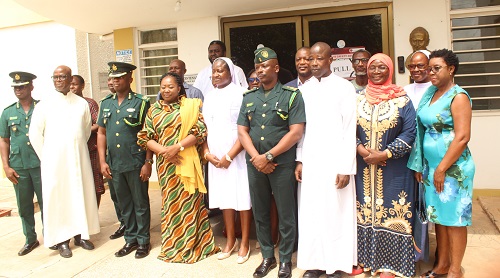
A total of 2,874 migrants were integrated into various communities in the country as at the end of 2022, Assistant Commissioner of the Ghana Immigration Service (GIS), Mr Isaac Ghansah, has said.
He said out of the number, 1,905 were males whilst 942 were females, with 1,939 being Liberians, who were also integrated through the granting of residence permits and other support programmes.
Mr Ghansah said this yesterday, in Accra, at the launch of a Support Service for Migrants and Refugees in Transit (SMART) being implemented by Caritas Ghana, a charity organisation of the Ghana Catholic Bishops Conference, with support from the Dicastery for Migrants and Refugee at the Vatican.
The SMART project provides responsive humanitarian assistance and reintegration support for returned migrants and refugees in Ghana, and curtails the menace of irregular migration from Ghana into the West.
Mr Ghansah said that, in the first quarter of 2023, 33 migrants were convicted for various offences, including attempt to obtain Ghana passport by false declaration and other documents through impersonation.
He noted that just last month, the Anti-Human Smuggling and Trafficking in Persons Unit of the Service, successfully prosecuted a human trafficking case, where suspects was convicted for 15 years imprisonment.
Mr Ghansah said the GIS play a prominent role in offering support to refugees and returned migrants through the collaboration with the Ghana Refugee Board and other international organisations, but some recalcitrant migrants tried to maneuver through the system.
“It is worthy to note that Caritas Ghana collaborated with GIS to pursue a number of interventions across the country, including; round table workshop, information sharing, community sensitisation, documentation of experiences of migrants and support to irregular migrants.
“Such intervention and engagement offer the youths in selected communities the opportunity to increase their knowledge and understanding of their migration choices and also expose them to dangers involved,” Mr Ghansah said.
The Assistant Secretary General of the National Catholic Secretariat, Reverend Charles Boampong Sarfo, said, Caritas Ghana, would work closely through the Diocesan Development Officers to implement the project activities.
He explained that, there would be a staff in each diocese where activities of the project would be implemented stressing that, Caritas Ghana would use a community-driven approach toward the project implementation.
Rev. Sarfo said that management of the project would engage the local government structure, to enable them learn from the project, to enable them include the project in the annual operational plan.
A Board Member of Caritas Ghana, Mrs Clara Beeri Kasser-Tee, said the project framework had five strategic plans, which included promotion of youth self-employment and empowerment, migration of refugees and their families, and improved institutional capacity, among others.
BY BERNARD BENGHAN & CECILIA LAGBA




